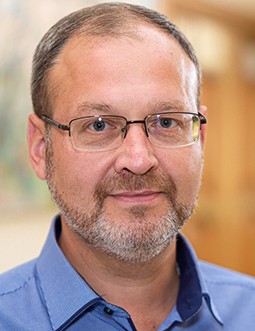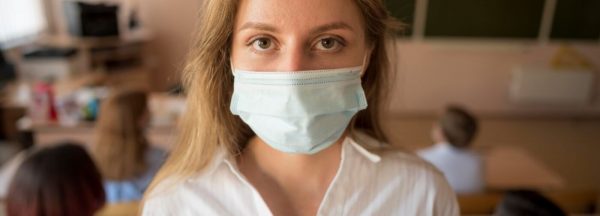 Some of the students missed each other so much that they talk almost non-stop with each other. Others have forgotten how to communicate, because during distance education their teenage crisis began. Parents control the educational process, and teachers are glad that “school no longer comes to their homes”. Ksenia Knorre Dmitrieva spoke with teachers about the discoveries of the first school week at school.
Some of the students missed each other so much that they talk almost non-stop with each other. Others have forgotten how to communicate, because during distance education their teenage crisis began. Parents control the educational process, and teachers are glad that “school no longer comes to their homes”. Ksenia Knorre Dmitrieva spoke with teachers about the discoveries of the first school week at school.
“School will not be the same as it was before the pandemic”
Artem Uporov, teacher of Russian language and literature at gymnasium No. 1543, said:

Artem Uporov
“After the distance learning regime, time has disappeared. How well we lived during the distance learning – we could sleep as long as we wanted and get up when the first lesson began. Not only children could immediately go out of bed to study, but many teachers could afford this for the first time in their entire teaching experience. Of course, surely some people did it differently, but I did it this way.
And after that, it turned out that it was physically very difficult to return to school. Now I have to get up early every day, at six in the morning, sometimes even earlier. Suddenly it turned out that our remote life absorbed so much that now it is very difficult to bear it on your shoulders, and now you no longer have time to pull the same load in full-time mode. At the distance education, you just switched the channels in Zoom, entered from one conference room to another, in Teams or somewhere else, and you didn’t have to move anywhere from your chair. But suddenly there was so much running around…
In addition, we, the teachers, returned not only to the lessons, but also to the responsibilities that were added to us. For example, now the regional stage of the All-Russian Olympiad will be held in schools, and teachers need to be with your children. Therefore, for example, I had no lessons on Saturday, but I had to get up at six in the morning and go to school to be present at the Physics Olympiad.
There are teachers who did not come to work after the distant education regime – teachers aged 65 and over and those who stayed at home due to some family circumstances. They conduct lessons remotely to children who are at school, but you can’t just leave the class with the teacher in Zoom, so we turn on the teacher’s broadcast, and one of the teachers is on duty in the office. On Monday, for example, I’m on duty at a senior colleague’s class.
I teach children of the most difficult age (although usually every teacher thinks so). I am the class teacher for seventh graders. So, during the distance learning, they forgot how to communicate with each other. They have clashes, they have forgotten how to negotiate and listen to each other.
There is no feeling as if we parted last Friday and met on Monday, of course. Many habits have to be re-formed. We have to teach children to communicate and react to adults, behave in a certain way in the classroom, prepare for lessons… Whereas during the distant learning, each family solved all these problems in their own way.
Children now grow up every month. After the distance learning, it feels like they returned from the summer holidays. They are completely different. This is what was invisible in Zoom. And now we need to establish relationships with these young men and ladies who left as children in the sixth grade. They are in their teenage crisis and do not understand how to behave. They lived alone with it every day and now brought it all to school. Yes, it turned out to be difficult, and now they need psychological support.
There are interesting discoveries. During the distant learning it became clear that school is not the only way to exist in the world, that there is still a lot of beautiful things in life and the school can come home by itself. Therefore, now someone is choosing not to return from distance education, but want to become a distance student. But switching to the distance education individually is a rather difficult task.
It seems to me that the school in the form in which it was before the pandemic will not recover. As a system, it will have to solve new problems. After all, the world has changed and will not roll back. Is the school ready to adapt to this new world, can it find some new forms of existence for itself? To do this, legislation, regulations, the concept and so much must change.
What else has changed exactly? Parents’ desire to correct the processes that take place at school has grown greatly. It’s huge now. They believe that if they organized the educational process at home for almost a year, now they can discuss the issue of organizing it at school on an equal basis with the teachers. Therefore, they can advise the teacher something, hint that this cannot be done this way, but should be done differently, and so on. I have been working at the school for 12 years, and even before the distant education, this desire increased every year.
Even 12 years ago, parents came to school with their children, and if you did not call them, they never voluntarily appeared. Not now. Parents want to be aware of everything. It is not enough for them to manage the environment in which their child is located – to understand nutrition, children’s school holidays, excursions, and so on. It is important for them to know: who teaches this subject, what is the foundation for this homework and not another, how often should exercise books be collected, why do we learn from this textbook, and not another, what is this grade for, on what principle are the points reduced? Etc.
It feels like the teacher has an additional supervisory body that monitors him or her all the time. And now, after the distance education, this has become too much.
Because for the first time in their lives, parents saw from the inside how their children’s studies are arranged – what kind of teachers they really have and how the lessons are organized. They saw them with our own eyes, not learned about it from the stories of their children. It is clear that in some lessons they admired and listened to the teacher themselves, were ready to help with the assignment. Others were horrified: “God, what’s going on?! Was it a lesson now or what?” Teachers, like uninvited guests, have appeared in homes through Zoom and Teams.
And now the parents say: “So, we looked at you, let’s talk about it now.” And I don’t know how to answer some questions. I think that by the end of the school year, when we give grades, this will be even more obvious.”
“The class no longer comes to our home”
Olga Petrova, teacher of Russian language and literature at a Moscow school, said:
“We said that the return from the distance learning would feel like September 1 all over again. But it turned out to be not the same at all. The children really missed school. They missed each other, the offices, the blackboard, and the dining room. They were so happy!
The students have matured. They have become wiser. They were very tired without studying at school, and so they absorb everything like a sponge. They need it. They are interested. They have been waiting for this for a long time. If earlier I had six frivolous children in my class, now there are one or two. Even those who said that the distance education is better are still glad that it ended. At least I see it in my 6th and 11th grades students.
After the distant education, I do not work with the electronic board yet. It makes me sick, I feel sorry for the eyes of the children, and we enthusiastically study from the textbook.
At school we thought that the students would adapt in a week or two. But no, they quickly returned to studying. The only drawback that I noticed as a teacher was that they lost a little pace: if earlier we managed to do three or four exercises during the lesson, now we can only do two. But I think the pace will quickly return.
I myself was scared to return to school. I did not know what kind of children would come. But the fear turned out to be unfounded, and everything went much better than we all thought. It’s good that we had an extra week of vacation when we really went to work. We managed to adapt to school and by the time the children returned, we were ready to work.
Teachers are humble about everything: what will happen, will happen. We hope that the pandemic will subside and we’ll stay at school. We are very worried about graduation classes. Although they have grown a lot this year, they have become more responsible and understand that they need to study, and it does not matter in what form. But we still hope that there will be no more distance education [for everyone].
Working in person is better. It does not scary me that I have to get up early now. You work at school, finish your lesson, come home, close the door, and that’s it. You can rest and relax. This is your refuge. But when school comes to your home every day, it’s mentally hard.
It is good that during the distance lessons we did not turn on the cameras, because we have large classes – the image was lost. With cameras it’s even harder, because then the whole school would come to your home. It doesn’t matter if you were sitting against a white wall or some other neutral background. Therefore, we were all glad that we could return to school. We are not intimidated by the fact that we have to get up early, because now we again have a place where we can hide and rest on the weekends.”
“Children hug each other in the school yard, and you can do nothing about it”
Sergey Sekhin, director of lyceum №1535, said:

Sergey Sekhin
“Everyone was waiting for the return to school, both teachers and children. Education is, first of all, the emotions that the teacher brings to the lesson. What emotions could he bring to a distance lesson? It is clear that he tried to revive the educational process in various ways, somehow brilliantly fill the lesson, but still the lack of emotions was obvious. This was the hardest part.
To build this emotional component, it was necessary to spend a lot of additional effort, both on one side of the screen and on the other. Therefore, I can say that a distance lesson takes away much more mental strength from both the teacher and, I think, the child.
For children, communication, especially for adolescents, is the leading activity, they really missed it. And now they want to communicate all the time: in the corridor, on the street, during lessons… Teachers say that this thirst for communication is very noticeable. Previously, you could hide behind an icon during a lesson and do something of your own in parallel, and not talk. Now, in the classroom, they are all happy to communicate with the teacher, because everyone missed it.
One of the disadvantages of the remote mode was the inability for the teacher to understand how the child perceives the material, how much he is included in the process, even if he had a camera on. And now we see children’s eyes again, we receive feedback, when you can sense each child’s expressions, understand how much the subject resonates with him. Everything that was right and normal has returned.
But, of course, now everyone has a period of adaptation. It is unusual for children to return to a different rhythm, regimen, to return to the obligation to complete some tasks. If earlier you could not do something because you are at home and something was kind of not entirely obligatory, now you have to do everything again.
Teachers say that getting out of this home routine, which everyone got used to in three months, is as difficult to get out of as returning to work after a vacation.
It is no coincidence that after the summer holidays there has always been a certain period of adaptation. Many find it difficult to return to their daily activities. One of our teachers said: “During the distant education, I sat in a working chair all day. The first lesson ended, the second began immediately, then the third… The family members brought me a cup of tea or coffee. At the house I went down from the second floor and everything hurt, because I didn’t do exercises. I forgot what it was like to go from office to office, all lessons were on the laptop.”
Both parents and children subconsciously have expectations and uncertainty. It also leaves its mark on everything. It influences the teacher, who understands that since everyone can go on distance education form at any time, it is necessary now to give the children as much as possible. Compensate for what was not given enough, not explained, not mastered. Teachers try to identify what deficits children have – and deficiencies are revealed – and compensate for them. On the other hand, not understanding how the situation might change, they try to make the study load as intense as possible. I also think that both parents and children subconsciously try to get as much educational effect as possible from this period.
I asked teachers, both those who are more experienced and those who do not have much experience yet, if they see any changes in children. But they don’t see them. Those who had a natural thirst for knowledge remained the same, and no distance education could destroy it. We have a girl from Balashikha who gets up every morning at five in the morning and comes to the lyceum. She did this before the distance education, she does it now too.
Children hug each other in the school yard when they see each other, and you can do nothing about it, regardless of any safe regime [meaning the social distance – Tr]: they really missed each other.
It is still difficult to understand how it will be possible to master the educational material during this period. But everyone notes that returning to school is undoubtedly good, because the educational effect is higher than at the distance education.”

















